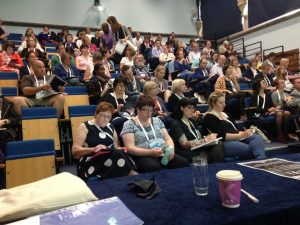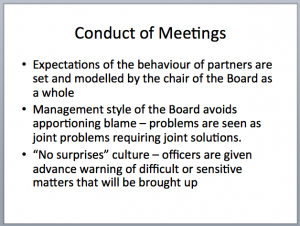This was my first Chartered Institute of Library & Information Professionals (CILIP) annual conference though I’d previously chaired events for them on outsourcing and participated in discussions on CILIP’s future direction. Vice Chair Karen McFarlane, a fellow BSI KM Standards Committee member asked me to speak to the Managing Information stream which for the 3rd consecutive year featured ‘leading KIM practitioners and commentators’. After speeches and masterclasses in 2016 in Amsterdam, Lisbon and London, Brighton was a nice and close change.
My first impressions on arriving at The Dome Brighton were: the size (600+ delegates); the slickness of the organisation (including the ‘hydration’ areas); and the lack of people (I counted less than 10%) with Knowledge in their title among the delegates.  I wondered how many might turn up to mine and Andy Bent’s session in The Courtroom.
I wondered how many might turn up to mine and Andy Bent’s session in The Courtroom.
In the event the session chaired by Sandra Ward was full (I counted 100) with some familiar faces in the audience including Sian Tyrrell who, despite not having ‘knowledge’ in her title, is doing great KIM work at Royal Horticultural Society.
My last bog post Future role of the Knowledge Manager: The Knowledgeur? described what my 30 minute address would cover so I won’t dwell on that here.
poor communication = poor knowledge sharing
Following me was Andy Bent, Bolton Metropolitan Borough Council, who sparked a lot of interest with his case study of an unnamed organisation who’d fallen foul of Ofsted and received a damming report which included censure about how they shared knowledge and information in the back office and how that translated to poor decision making at board level.
Inevitably the remedy included better communication and engagement and greater ownership of the issue at board level by the appointment of an officer to ensure changes are made.

Perhaps the most important observations Andy made were contained in this slide:
It made me recall the time when I was the Chairman of a business and gave my CEO explicit instructions to introduce a “no surprises’ regime. Each week I asked her to let me have a list of the key issues from the week and how they were resolved. If any were outstanding they became issues for board discussion.
Knowledge Management is dependent on good communication and engaged people. Andy’s presentation was a good reminder of how by getting it right you can turn bad news into good. The organisation in question subsequently got a great Ofsted report.
KM in a library & information environment
Does KM and KM’ers sit comfortably within CILIP? If so how is that recognised across the membership and in its charter? Is it a broad enough church to accommodate, Librarianship, Information Management and Knowledge Management or is it a case of oil and water?
Obviously the CILIP team think it all voices can be heard. The opening paragraph of the leaflet I was given before I presented said:
CILIP is committed to embracing KIM (Knowledge and Information Management) fully within its work. It is part of our challenging Action Plan 2016-2020, recently agreed following a major consultation exercise with CILIP members and other stakeholders.
And CILIP has just launched a new KIM Special Interest Group starting in 2017.
Is there a natural synergy? I can think of a number of very good KM professionals such as Sian who have a Library & Information grounding. Indeed KM is very much dependent on good curation of knowledge assets and the maintenance of effective knowledge bases.
I struggle though to make the leap from Public Librarian, those that work in institutions that seem to be under permanent threat of closure and who are often a great community hub, to that of a Knowledge Manager (let alone that of a Chief Knowledge Officer) who is often solving a burning business issue or mitigating a business risk.
Certainly there is a difference in perception and financial reward. Last year a prominent law firm made 2 C-Suite appointments noting:
The roles of Chief Knowledge Officer and Chief Information Officer are increasingly important to a global law firm’s success.
A quick glance at salary scales reveal that a Director of Knowledge Management will be remunerated in excess of £100k. A more junior Knowledge Management Officer is likely to be paid £60k+ and be expected to perform these tasks:
- The Knowledge Management Officer is responsible for capturing, developing, sharing, and effectively using organisational knowledge. This role is fundamental to continuous improvement in sales excellence and bidding in order to drive an increase in the bidding success rate across …..
- By storing and sharing information effectively (e.g. case studies, exemplar responses, previously developed value propositions) and through the production of best practice processes, templates, how to guides and checklists, the Knowledge Management Officer will help … to win work more efficiently by enabling those involved in bidding opportunities small or large to harness the experience of others.
Few of the KM jobs specify a requirement for academic qualifications in Knowledge Management but most Library roles ask for MSc in Library & Information Management and it is unlikely that the Head of Library & Information Services will be remunerated as handsomely as their KM counterparts.
Where the ‘rubber hits the road’, and the overlap between Libriaranship, Information Management and Knowledge Management is most obvious, is in the health sector. Interestingly there is a Chief Knowledge Officer of Public Health England whose remit is:
The Chief Knowledge Officer (CKO) is responsible for delivering an effective knowledge and intelligence service that covers research, statistics and know-how, to inform the practice of public health and public health improvement.
Knowledge for Healthcare can shape society, improve the wellbeing of people and save lives through the effective use of knowledge sharing which depends of the solid foundation that Library & Information Professionals bring. The use of checklists has transformed post operation mortality rates and F1 technology improved the monitoring of children’s recovery. Health informatics (and Open Data) are helping to improve global hygiene and reduce disease transmission.
accentuating the difference
The closing keynote from Lauren Smith took me by surprise. Her tweet a good illustration of her key theme which was that Libraries (and Librarians) should be / are already political, providing a service for the good of the public.
Need to shift debate with stories and evidence to get public to see public libraries as institutions for social justice #CILIPConf16

This tweet alongside from a delegate pretty much summed up what the audience heard.:
That is some way though from the mindset of the KM professional who (apart perhaps from Healthcare KM’ers) is focused on delivering business value to his / her organisation rather than providing a service for the good of mankind.
Therein lies the quandary and the challenge for peaceful and fruitful co-existence if CILIP”s future vision of being the natural Industry Body for Knowledge Management professionals as well as Librarians and Information Professionals is to be realised.
And finally
Contained in the ‘Surprises and Admiration’ Chapter of the forthcoming book I mentioned at the start we note:
… there is no recognized industry body promulgating KM setting universally agreed qualification or certification criteria that employers find acceptable for entry and advancement.
Instead global KM’ers are attracted to training programs run by private organizations in order to demonstrate knowledge through external certification. Experience is gained on the job and there have been few mentors or coaches to help a newbie KM’er take their first steps.
Engagement with the Government’s Knowledge and Information Management Group (GKIM) is to be welcomed as a first and critical step as I have long argued that Knowledge and Information Management are natural and synergistic bedfellows. Where better to start than with the Civil Service who have KIM as one of its Professions.
I wish CILIP well in their efforts to becoming the go to body for KIM’ers.

 Lauren Smith
Lauren Smith